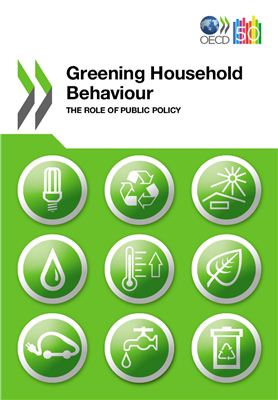OECD, 2011, 191 pages
This publication presents the main results and policy implications of an OECD survey of more than 10 000 households in 10 countries. It offers new insight into what policy measures really work, looking at what factors affect people’s behaviour towards the environment in five areas: water use, energy use, personal transport choices, organic food consumption, and waste generation and recycling.
Household consumption pattes and behaviour have an impact on stocks of natural resources, environmental quality and climate change.
This is expected to increase significantly in the future. In response, govements have introduced a variety of measures to encourage people to take into consideration the environmental impact of their purchases and practices.
These may include environmentally related taxes, energy performance standards for homes, carbon dioxide emission labels for cars, and financial support to purchase solar panels, among others. Nevertheless, understanding and influencing household behaviour remains a challenge for policy makers.
Greening Household Behaviour: The Role of Public Policy is an invaluable resource for all those interested by the challenging questions of what promotes "greener" lifestyles, from policy makers to individual citizens.
Table of Contents
Policies, Environmental Norms and Household
Why household behaviour matters
The environmental policy context
The role of environmental attitudes and norms
Variation across economic and demographic characteristics.
Residential Water Use
Introduction
Determinants of water consumption
Determinants of water saving behaviours and investments
Willingness-to-pay for improved water quality
Residential Energy Use
Introduction
Main factors influencing energy consumption and energy-saving behaviour at home
Main determinants of investment in energy-saving equipments
The demand for renewable energy
Conclusions and policy implications
Waste Generation, Recycling and Prevention
Introduction
Waste generation
Waste recycling
Waste prevention
Personal Transport Choices
Introduction
Literature review
Mode choice
Car ownership, choice and use
Public transport accessibility and use
The determinants of mode choice
Conclusions and policy implications
Organic Food Consumption
Introduction
Main motivations to consume organic food
The role of labelling and certification
Main difference in attitudes and behaviour across households
Willingness-to-pay for organic foods
Conclusions and policy implications
Conclusions and Policy Implications
Introduction
General cross-cutting policy lessons
Area-specific conclusions and policy implications
Moving forward
This publication presents the main results and policy implications of an OECD survey of more than 10 000 households in 10 countries. It offers new insight into what policy measures really work, looking at what factors affect people’s behaviour towards the environment in five areas: water use, energy use, personal transport choices, organic food consumption, and waste generation and recycling.
Household consumption pattes and behaviour have an impact on stocks of natural resources, environmental quality and climate change.
This is expected to increase significantly in the future. In response, govements have introduced a variety of measures to encourage people to take into consideration the environmental impact of their purchases and practices.
These may include environmentally related taxes, energy performance standards for homes, carbon dioxide emission labels for cars, and financial support to purchase solar panels, among others. Nevertheless, understanding and influencing household behaviour remains a challenge for policy makers.
Greening Household Behaviour: The Role of Public Policy is an invaluable resource for all those interested by the challenging questions of what promotes "greener" lifestyles, from policy makers to individual citizens.
Table of Contents
Policies, Environmental Norms and Household
Why household behaviour matters
The environmental policy context
The role of environmental attitudes and norms
Variation across economic and demographic characteristics.
Residential Water Use
Introduction
Determinants of water consumption
Determinants of water saving behaviours and investments
Willingness-to-pay for improved water quality
Residential Energy Use
Introduction
Main factors influencing energy consumption and energy-saving behaviour at home
Main determinants of investment in energy-saving equipments
The demand for renewable energy
Conclusions and policy implications
Waste Generation, Recycling and Prevention
Introduction
Waste generation
Waste recycling
Waste prevention
Personal Transport Choices
Introduction
Literature review
Mode choice
Car ownership, choice and use
Public transport accessibility and use
The determinants of mode choice
Conclusions and policy implications
Organic Food Consumption
Introduction
Main motivations to consume organic food
The role of labelling and certification
Main difference in attitudes and behaviour across households
Willingness-to-pay for organic foods
Conclusions and policy implications
Conclusions and Policy Implications
Introduction
General cross-cutting policy lessons
Area-specific conclusions and policy implications
Moving forward

